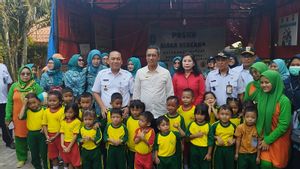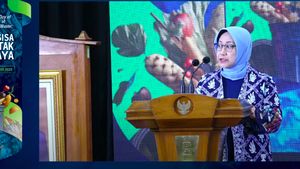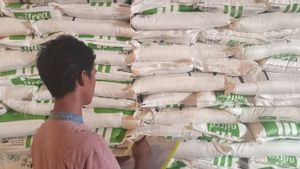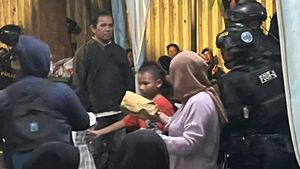JAKARTA - Member of Commission IX DPR RI, Kris Dayanti (KD) reminded the Government's commitment to suppress the problem of malnutrition in children for the realization of the 2045 gold generation program. This is because there are still many Indonesian children who are found to be experiencing malnutrition, both malnutrition and stunting problems.
"Poor nutrition in children is a serious problem that threatens the next generation of the nation. Despite the improvements in recent years, further efforts are needed to overcome this problem," said Kris Dayanti, Thursday (12/10/2023).
According to him, the DPR found that there were still quite a lot of children in various regions who were malnourished. Even until the conditions are quite alarming.
Kris Dayanti also highlighted the presence of a child with malnutrition which was recently revealed in Banyumas, Central Java. A 9-year-old boy named Aldila Dwi Alfian is malnourished so that his body only leaves the bones wrapped in the skin. This boy who lives in a poor family environment does not have a Healthy Indonesia Card (KIS) and his family is not included in the Family Hope Program (PKH).
Commission IX of the Indonesian House of Representatives in charge of health affairs is also concerned about Aldila Dwi Alfian's condition. Kris Dayanti also mentioned how Aldila's family was not included in the list of beneficiaries.
"The central government has prepared a very good program. But often data collection in the regions is not optimal so those who should be able to get assistance are actually not affordable. This needs to be improved," he said.
The incidence of children experiencing malnutrition does not only occur in small cities. In the capital, it is also indicated that there are still children who are malnourished due to their family's economy. Such as information from the West Pejaten Village, Pasar Minggu, South Jakarta, where it was found that 19 children were experiencing malnutrition.
SEE ALSO:
The legislator from the East Java V electoral district reminded that the Government needs to ensure that nutritious food is easily accessible to all levels of society. Especially, said Kris Dayanti, for low-income residents.
"Increasing the program of providing additional food or food subsidies can help families who have difficulty meeting their children's nutritional needs. This effort must be done carefully to ensure the right targets and effectiveness," he said.
Both malnutrition and stunting, continued Kris Dayanti, are serious problems that require synergy between the central and regional governments. According to him, it is important to carry out an effective educational campaign, including counseling on the importance of balanced nutrition, exclusive breast milk for the first six months, and a healthy diet.
"If people are aware of nutritional problems, parents will make more efforts and pay special attention to the fulfillment of their children's nutrition," explained Kris Dayanti.
On the other hand, Kris Dayanti assessed that one of the factors in the Indonesian people's malnutrition is being triggered by restrictions on production that are applied to food trading. This causes vulnerability to nutritional status and calorie intake.
Therefore, Kris Dayanti encourages the Government to focus on food sovereignty policies. Among other things, by utilizing biodiversity, increasing agricultural cultivation, and consistency in the implementation of productive agricultural land protection.
"The government needs to develop research and development of superior seeds in agriculture, livestock and fisheries," explained Kris Dayanti.
"To achieve this, the Government also needs to collaborate with universities and other research institutions to present a breakthrough that will maintain our food sovereignty," added the member of the House of Representatives' Inter-Parliamentary Cooperation Agency (BKSAP).
Kris Dayanti assessed that the development and research in terms of food sovereignty can be carried out through the National Research and Innovation Agency together with the Ministry of Agriculture (Kementan), the Ministry of Health (Kemenkes), and other related agencies.
To give full strength to BRIN, KD also encourages the development of the Indonesian Food Data Center. With the well-organized food data, it will make it easier to create renewable innovations.
"By placing mastery of science, research, and innovation as a priority through concrete programs, we can determine the achievement targets within a certain period of time to reduce dependence on imported food," said KD.
Furthermore, the DPR member who is also the Indonesian diva encouraged the Government to make land mapping and special regulations related to the zoning of fertile land. According to KD, the goal is that fertile agricultural land is not diverted.
"We also encourage the Government to form a new state bank or transfer the function of the Government bank to support farmers and fishermen. This is necessary to increase access to financing for them," he said.
Kris Dayanti hopes that various program interventions carried out by the Government can reduce the problem of malnutrition and stunting. Given that the Government also has a national stunting reduction target of below 14 percent by 2024.
Meanwhile, based on the results of the 2022 Indonesian Nutrition Status Survey (SSGI), the prevalence of stunting in Indonesia is still 21.6 percent. This figure has decreased from the previous year of 2.8 percent.
"The gap is still too far. So we must quickly catch up with various efforts, including budget support which by us in the DPR is always prioritized on this stunting and nutrition problem," explained Kris Dayanti.
Kris Dayanti also added that improving health services at all levels from Posyandu to hospitals is also important to pay attention to in terms of stunting management in Indonesia. He also supports various intervention programs from the Government, including by increasing the type of free immunization for children.
"Let us work together to ensure that the children of the nation's next generation can grow well. Because they are Indonesia's future hope," he concluded.
The English, Chinese, Japanese, Arabic, and French versions are automatically generated by the AI. So there may still be inaccuracies in translating, please always see Indonesian as our main language. (system supported by DigitalSiber.id)

















